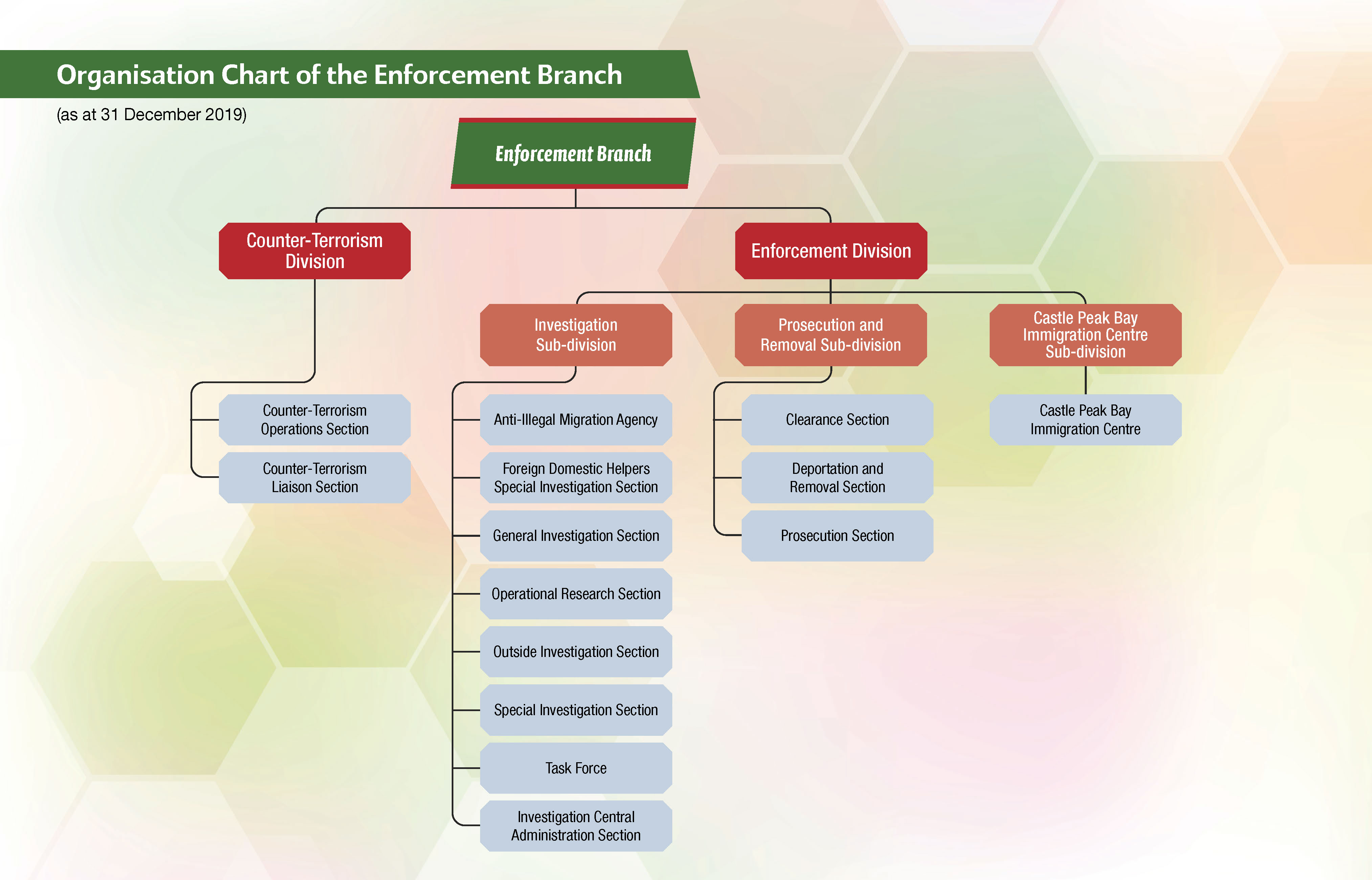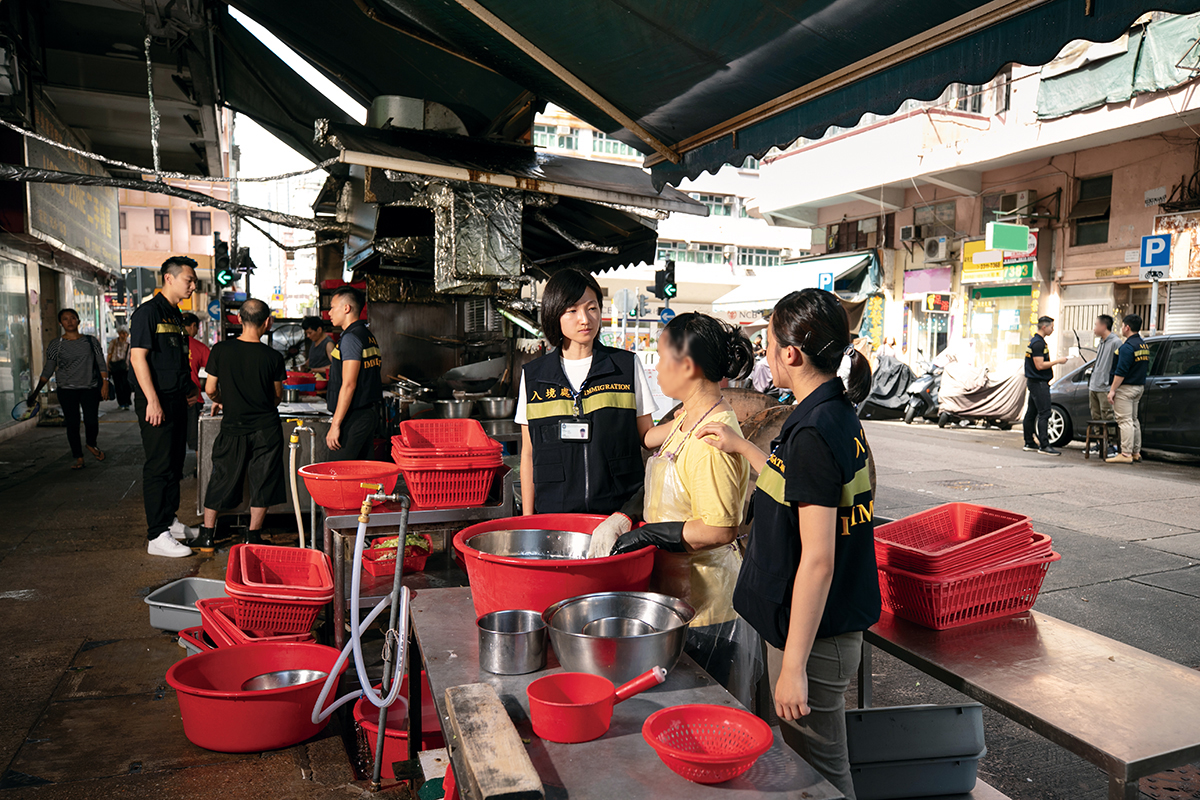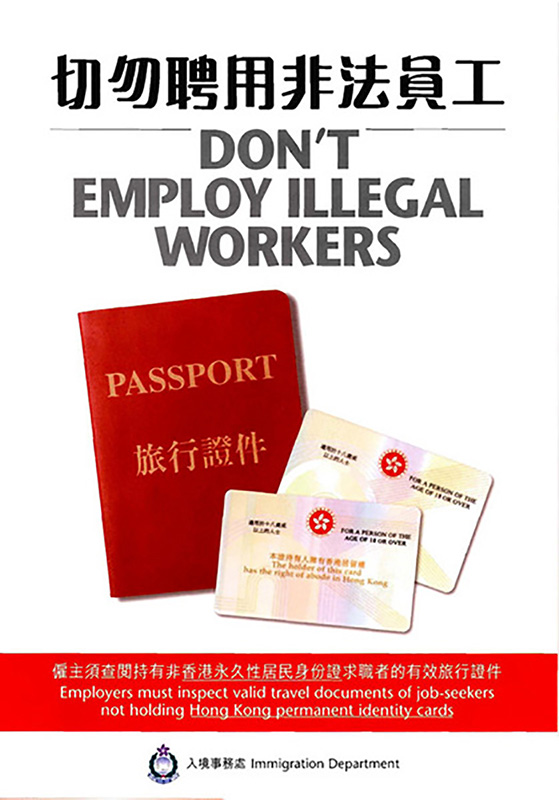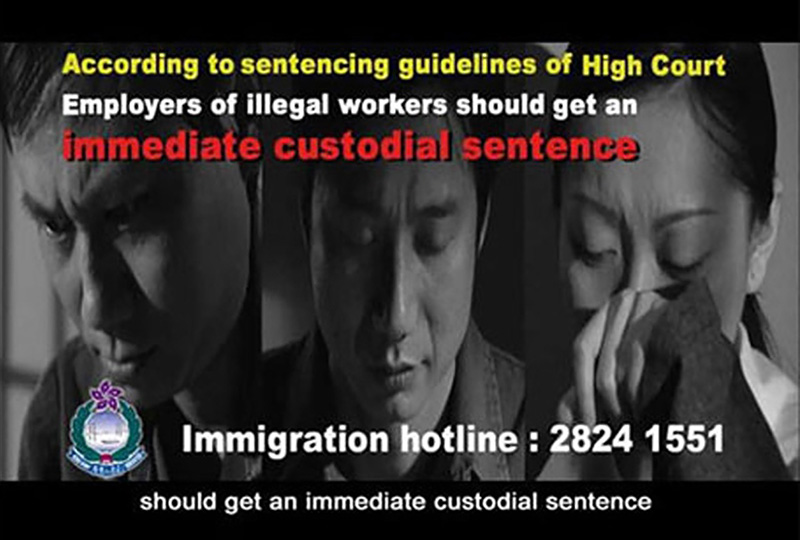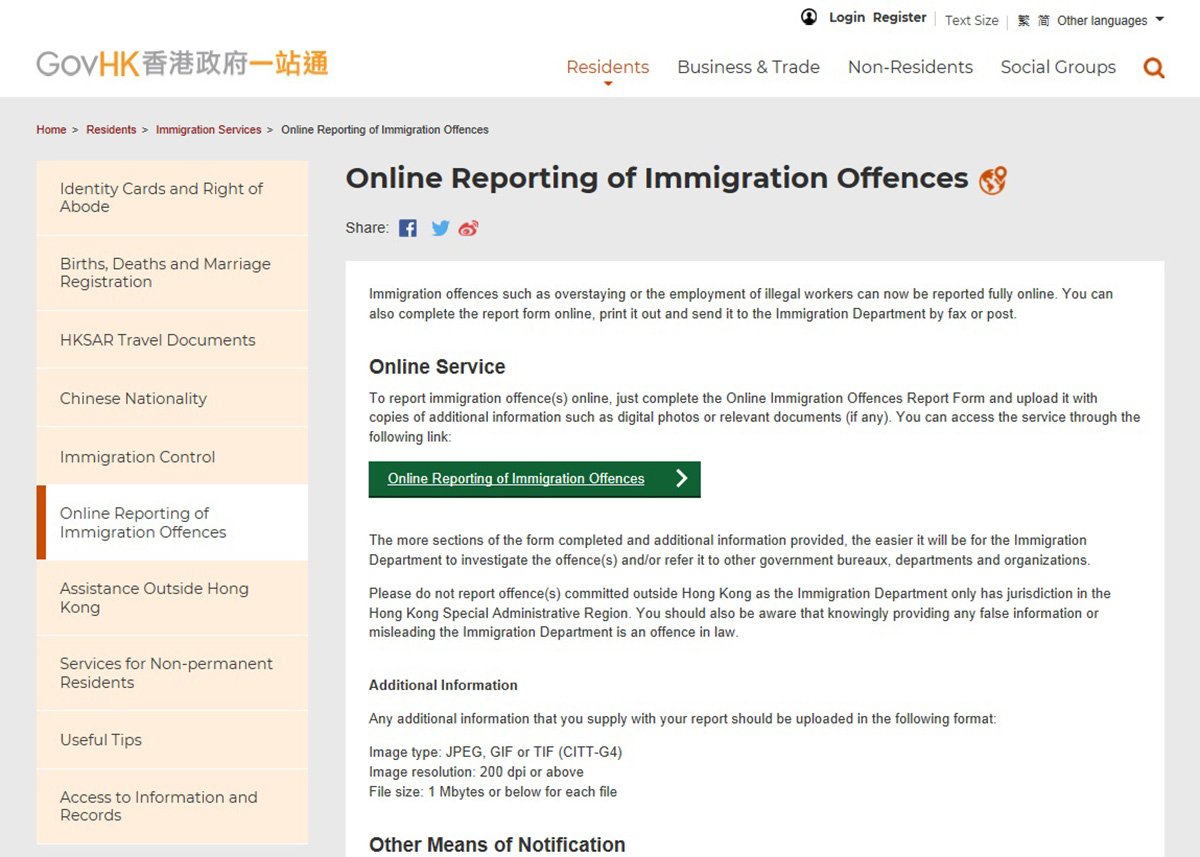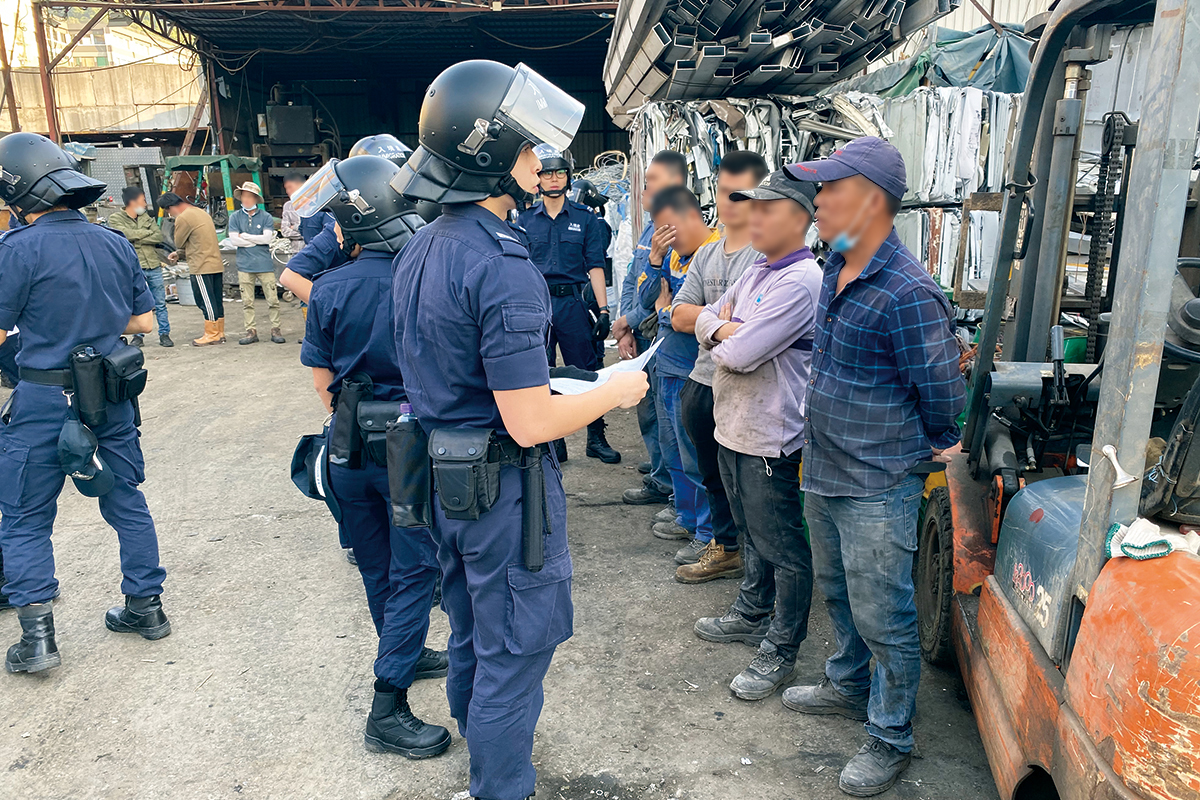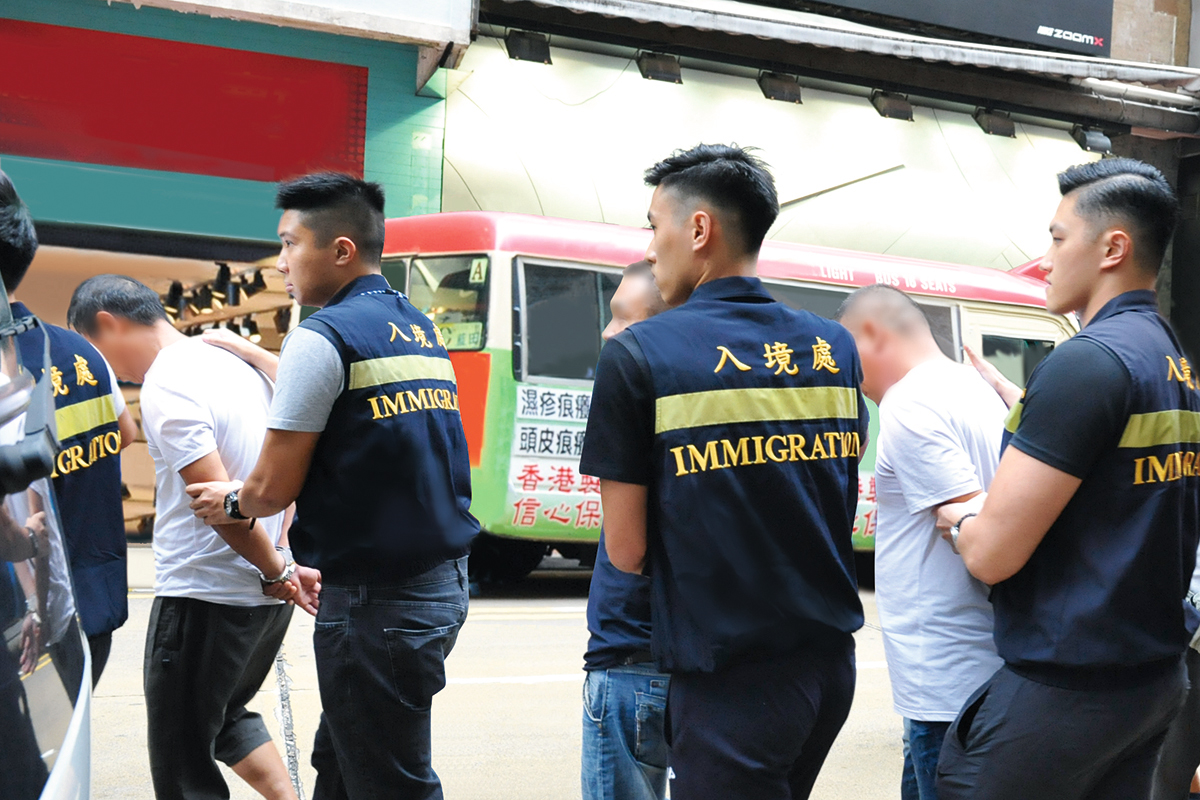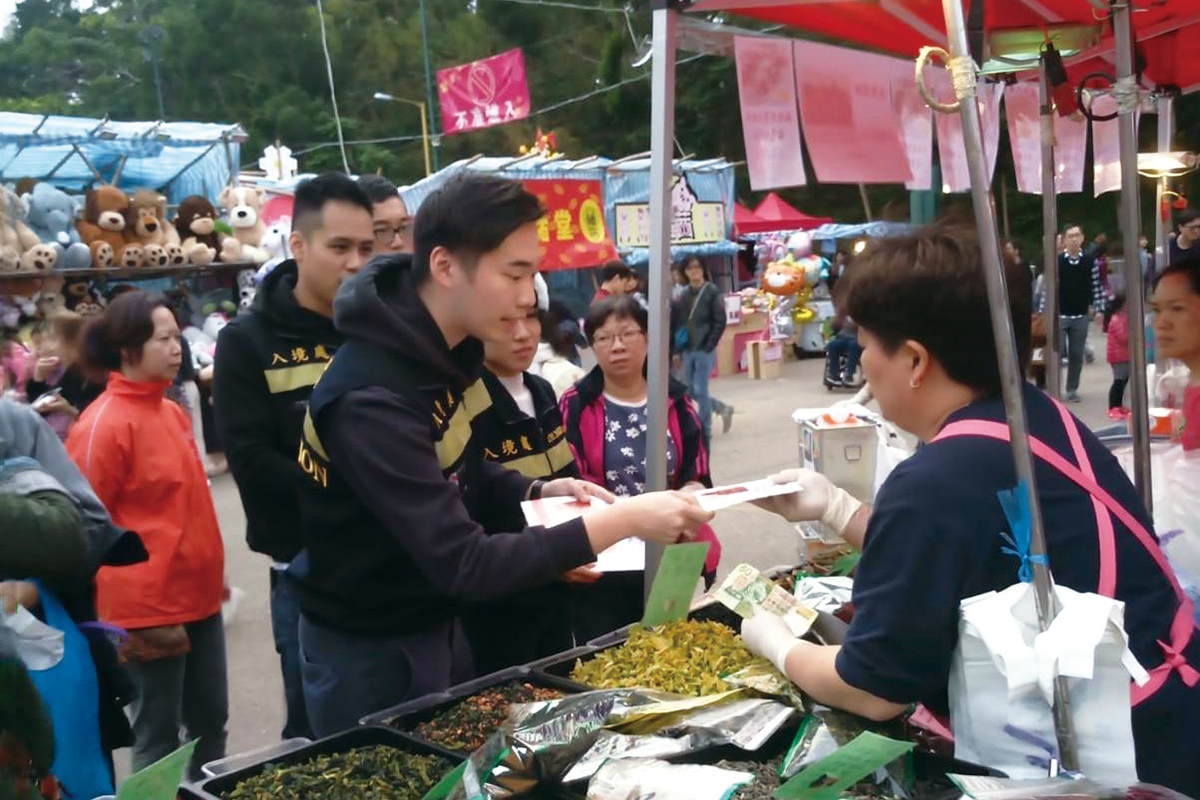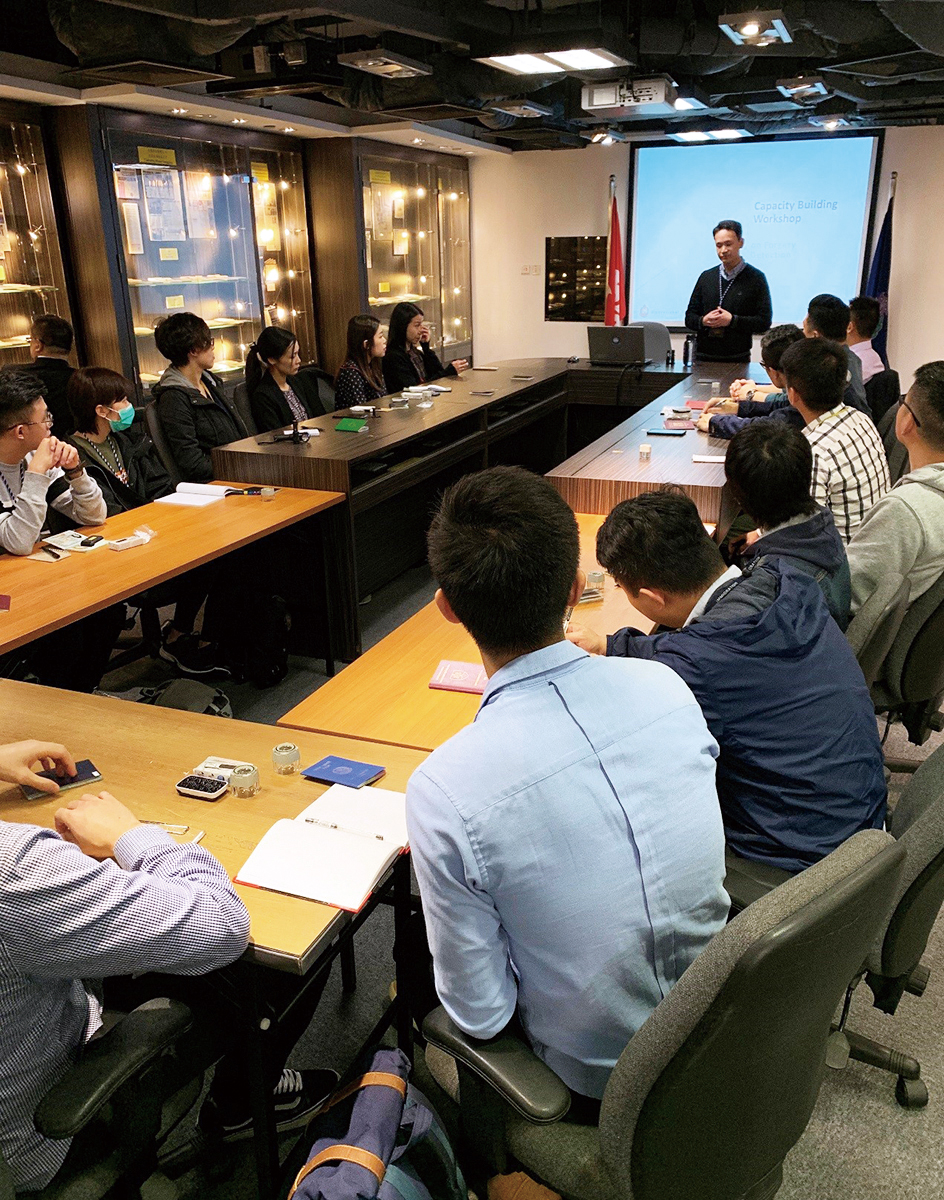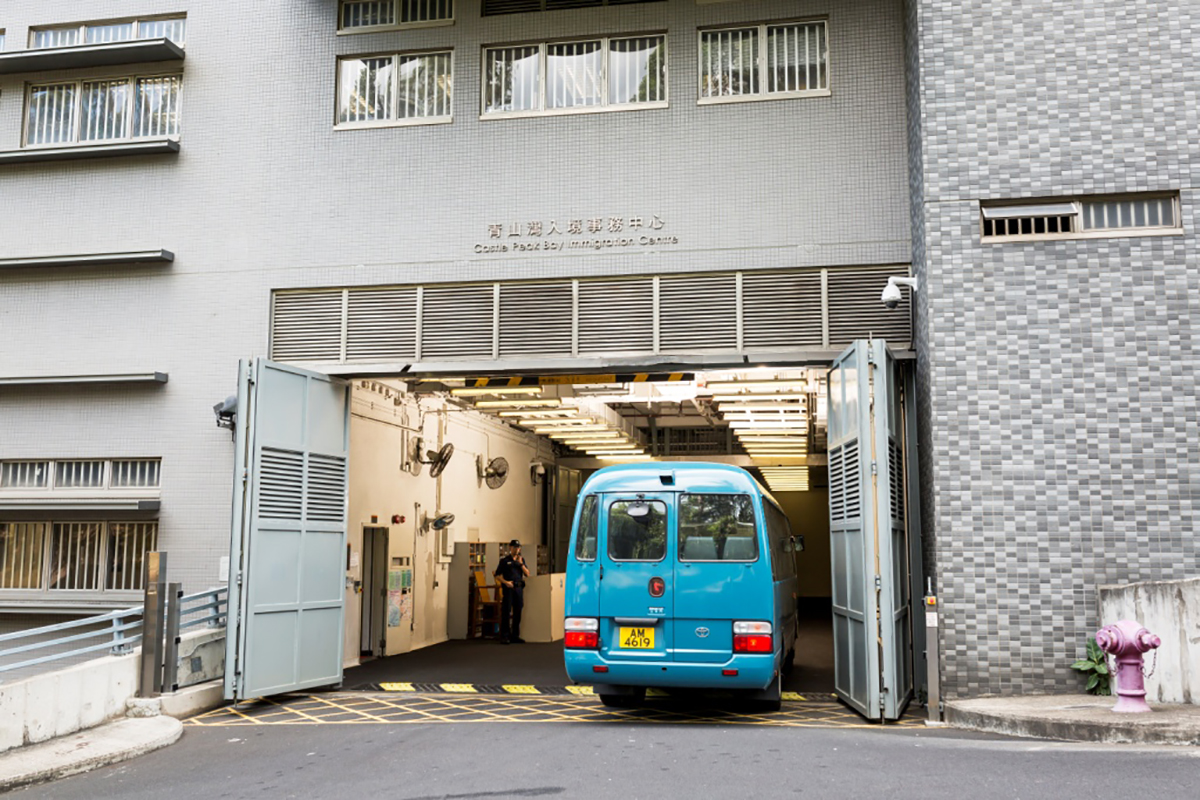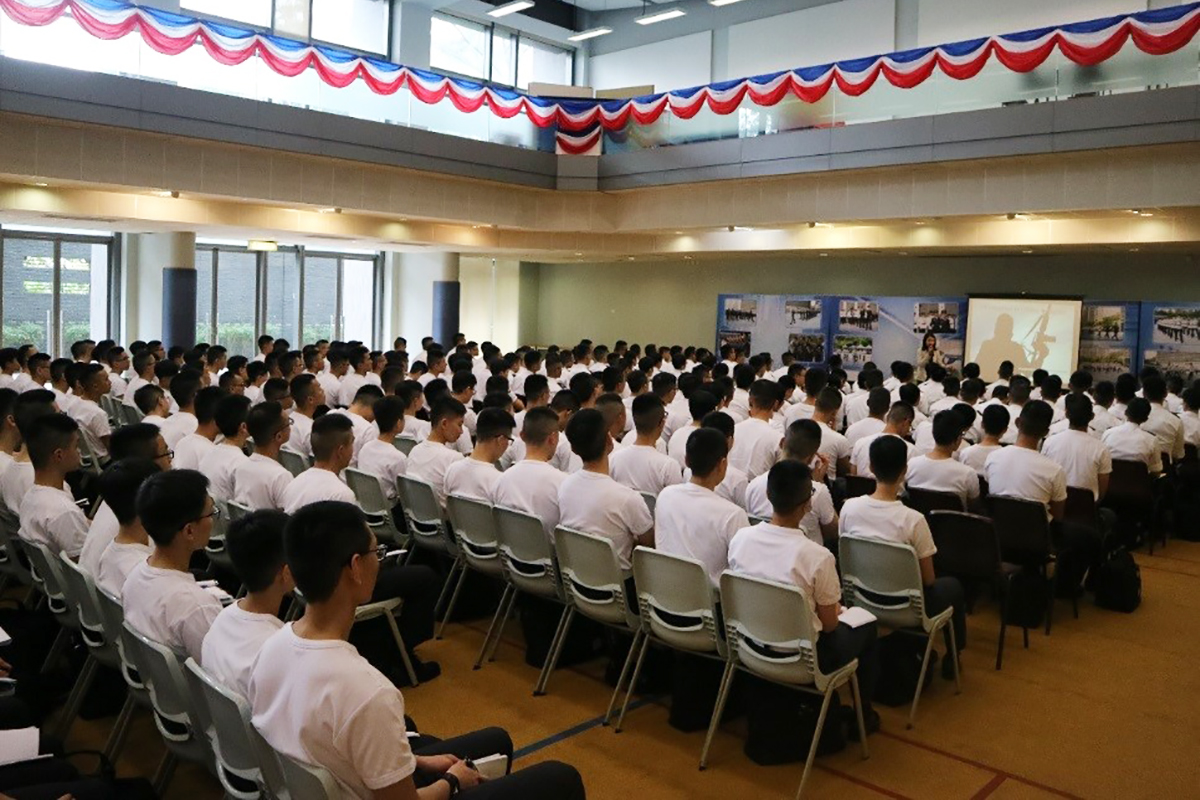Under the command of an Assistant Director, the Enforcement Branch comprises the Enforcement Division and the Counter-Terrorism Division. Each division is headed by a Principal Immigration Officer.
The Enforcement Division is responsible for formulating and implementing policies in respect of investigation, and handling immigration-related prosecutions. It is also responsible for formulating and implementing measures in repect of deportation and removal (other than non-refoulement claimants), and managing the Castle Peak Bay Immigration Centre for detention of persons of 18 years old or above. The Counter-Terrorism Division is responsible for formulating departmental strategies relating to counter-terrorism (CT) and taking relevant enforcement action, and liaising with local, Mainland and overseas law enforcement agencies as well as consulates in Hong Kong for CT intelligence exchange. Officers of the Counter-Terrorism Division also serve as the department's representatives in the Inter-departmental Counter Terrorism Unit (ICTU).
Investigation and Intelligence
The Immigration Department has made concerted efforts to uphold the laws of Hong Kong by investigating into offences under the Immigration Ordinance and the Registration of Persons Ordinance, and offences relating to the registration of births, deaths and marriages; instituting removal and deportation proceedings against illegal immigrants and undesirables; and maintaining intelligence on global immigration matters.
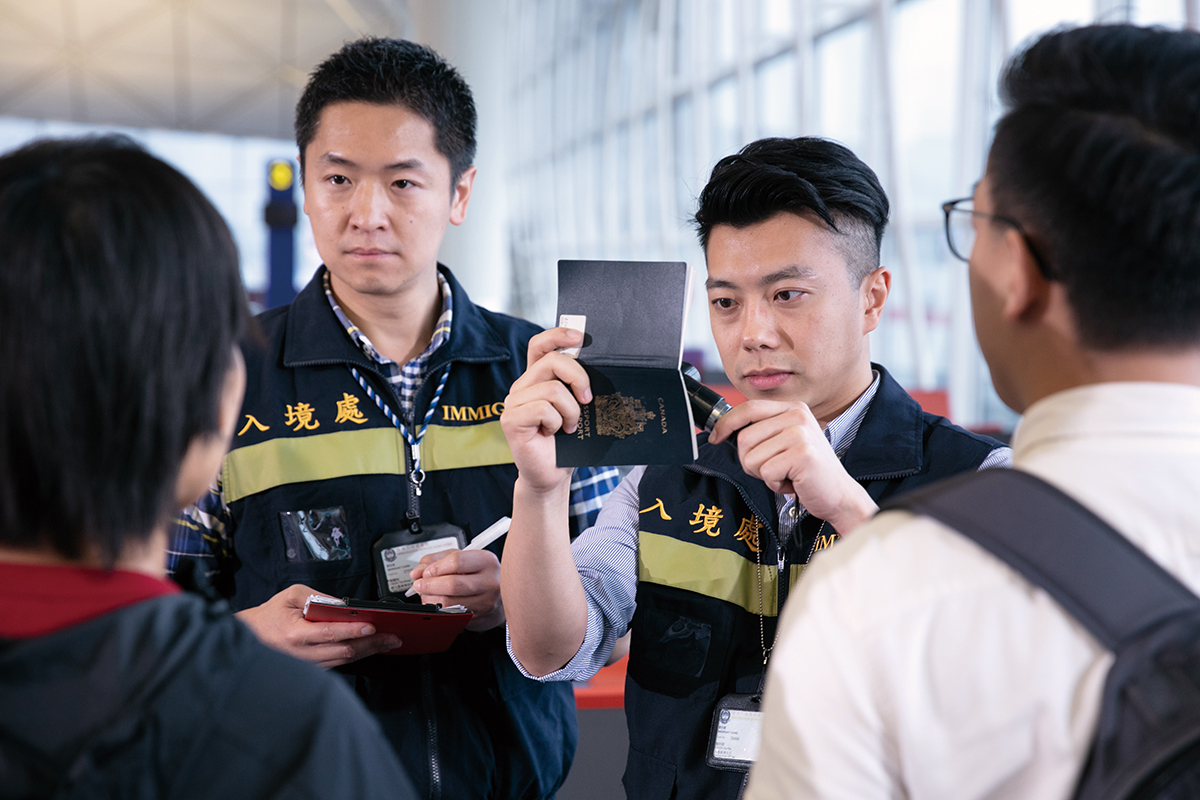
Our officers conduct operations against the use of forged travel documents and human smuggling activities at the Hong Kong International Airport.
Anti-Illegal Migration Agency (AIM)
To further strengthen law enforcement action against the use of forged travel documents and human smuggling activities at the Airport, the department established an Airport Investigation Group (AIG) when Hong Kong International Airport at Chek Lap Kok came into operation on 6 July 1998. The AIG and the Tactical Intelligence Group (TIG) were put under the management of the Anti-Illegal Migration Agency (AIM), which was formed on 28 June 2004. The main charter of AIM includes investigations of forgery and illegal migration cases intercepted at Hong Kong International Airport and other control points, focused investigations of forgery syndicates involved in the abuse of HKSAR passports, and collection and analysis of the latest modus operandi of forgery syndicates and users.
Mainland Illegal Immigration
In 2019, the number of Mainland illegal immigrants intercepted was 284 and none of them was involved in sex work. There was no surrendered pregnant Mainland illegal immigrant in 2018 and 2019.
Since the gazettal of the application procedures for the Certificate of Entitlement in July 1999, the number of surrendered minor illegal immigrants from the Mainland has declined sharply. In 2019, there were two cases of surrendered minor, while there was no case in 2018.
Unlawful Employment
In 2019, the department continued to maintain high vigilance against illegal workers and actively took tough and effective enforcement action against unlawful employment of illegal immigrants, visitors, foreign domestic helpers (FDHs) and imported workers who were subject to specific employment conditions so as to protect the local labour market. Measures taken included propagation of related government policies and regulations, and frequent surprise checks on factories, restaurants, laundry factories, shops, markets, foot reflexology centres, residential and commercial premises under renovation, construction sites, refuse collection points, and waste materials recycling factories, container depots and warehouses situated in the border and remote areas in the New Territories. In 2019, 5,444 illegal workers, including 3,756 persons engaged in sex work, were arrested. Most of the illegal workers were prosecuted and fined or imprisoned before repatriation to their places of domicile. Moreover, section 38AA of the Immigration Ordinance came into effect on 14 November 2009, which prohibits illegal immigrants or people who are the subject of a removal order or deportation order from taking any employment, whether paid or unpaid, or from establishing or joining in any business. Since the Ordinance came into effect till the end of 2019, 2,347 persons were arrested on suspicion of breaching the Ordinance.
To combat offences relating to parallel trading activities, the department has stepped up enforcement action by mounting a series of anti-illegal worker operations codenamed 'Windsand' since September 2012. As at the end of 2019, a total of 690 operations were conducted with the apprehension of 3,612 Mainland visitors for breaching their conditions of stay by suspected involvement in parallel goods trading, and 20 local employers suspected of employing illegal workers. Among them, 233 Mainland visitors were convicted and sentenced to imprisonment ranging from four weeks to three months. According to the existing mechanism, the department will pass the particulars of those Mainland visitors convicted of illegal employment in Hong Kong to the Mainland authorities for cancellation of their exit endorsements and they are prohibited from visiting Hong Kong for two years. For persons suspected of being involved in parallel goods trading but are not prosecuted, their future arrival will be closely scrutinised. They will be refused entry and repatriated to the Mainland immediately if their purposes of visit are dubious.
To strengthen crime prevention measures and enforcement action against illegal activities, including unlawful employment, an inter-departmental task force comprising the Immigration Department, the Hong Kong Police Force (HKPF), the Customs and Excise Department, the Labour Department, the Correctional Services Department and the Food and Environmental Hygiene Department was set up in April 2003.
Furthermore, in order to enhance the effectiveness in curbing unlawful employment activities, the department set up an Anti-illegal Workers Combat Squad in January 2005 as a speedy and robust force to combat illegal workers and their employers. The squad conducts plain-clothes patrols at black spots of illegal workers and makes prompt response to reports of unlawful employment.
Employers of illegal workers were also subject to prosecution. In 2019, 246 employers were prosecuted for employing illegal workers. Many of the prosecuted employers were sentenced to jail. As a deterrent measure against unlawful employment, the Court of Appeal (CA) laid down a sentencing guideline in September 2004 reaffirming that employing a person not lawfully employable is a serious offence and the employer of an illegal worker should be given an immediate custodial sentence even for the first offence. The CA also stated that the presence of other aggravating factors, such as exploitation of illegal workers, employment of multiple illegal workers or repeated offences, will in most cases substantially increase the sentence. In addition, the government is considering amending the relevant provisions of the Immigration Ordinance to increase the penalties for employing persons who are not lawfully employable.
To prevent illegal workers from taking up renovation work in public and private housing estates, the department issued guidelines to the parties concerned to enhance proper record keeping of flats under renovation and the particulars of the flat owners, contractors and workers. Consequently, there has been an obvious decrease in the number of illegal workers taking up renovation work in well-managed housing estates.
On the issue of illegal workers using or possessing a forged or other person's identity card, the CA handed down a sentencing guideline in March 2005. The Court found that for an offence of possession of a forged/other person's identity card, even when the offender's presence in Hong Kong is legal, the sentence should be 12 months' imprisonment after a guilty plea. If the forged/other person's identity card had been presented/used to conceal one's status, so as to seek unlawful employment or to further one's illegal stay in Hong Kong, the sentence should be 15 months' imprisonment after a guilty plea.
Apart from the Announcement in the Public Interest (API) on television to remind the public not to employ illegal workers, the department has also launched an API on radio in Punti dialect, Putonghua and English to arouse public awareness of the serious consequences of employing illegal workers who are holders of immigration recognizance forms. The API highlights the sentencing guideline and aims to disseminate the message to members of the public that employers of illegal workers will be given immediate custodial sentence. In 2019, the department continued to enhance publicity by producing an API entitled 'Don't Hire Illegal Workers' to remind employers that employing persons who are not lawfully employable is a serious criminal offence liable to immediate imprisonment. The API has been broadcast on television and uploaded to the ImmD's YouTube channel.
The department encourages members of the public to report immigration offences such as overstaying or employment of illegal workers by mail (address: 5/F, Skyline Tower, 39 Wang Kwong Road, Kowloon Bay, Kowloon), by calling the department's 24-hour hotline (2824 1551), by fax (2824 1166), by e-mail (anti_crime@immd.gov.hk) or by online reporting (www.gov.hk/orio). The department will continue to combat unlawful employment through various channels and appeals to members of the public not to employ illegal workers.
Immigration Task Force
Apart from conducting enforcement operations against immigration offenders, the Immigration Task Force also reinforces offices which require additional manpower resources to cope with an upsurge in workload. In 2019, 13,759 enforcement operations, including 397 large-scale joint operations with other government departments, were conducted. A total of 5,153 immigration offenders were arrested.
During the year, in order to curb the prevailing trend of unlawful employment, the Task Force also conducted a number of special operations codenamed 'Twilight', 'Contribute', 'Fastrack', 'Greenlane', 'Interrupt', 'Powerplayer', 'Rally', 'Champion' and 'Flabbergast' against illegal workers in various businesses. The Task Force will continue to step up enforcement action against illegal workers and their employers to safeguard job opportunities for the local workforce.
To step up publicity campaigns against the hiring of persons not lawfully employable and to raise public awareness of the serious consequences of unlawful employment, the department from time to time distributes 'Don't Employ Illegal Workers' leaflets to store-keepers and disseminates the message in talks or seminars organised by estate management companies, other government departments and public organisations when necessary.
Investigations into Forged Documents
The department is highly concerned about the use of forged travel documents, either for illegal migration, crimes or terrorism. Such illicit activities pose threat to immigration control and the security of the countries concerned and undermine the probity of the passports being forged. As syndicated forgery activity is a global problem, the department works closely with the local, Mainland and overseas law enforcement agencies to conduct covert investigations into cases of forged documents. Resolute actions are taken to detect the use of forged travel documents by travellers and illegal migrants who are in transit through Hong Kong to other countries. In 2019, the department conducted 29,074 anti-forgery operations. The number of forged documents detected was 572, representing an increase of 27.4 per cent as compared to 449 in 2018.
Since its issue, the Hong Kong smart identity card has become a target of forgery syndicates. In 2019, a total of 112 forged Hong Kong smart identity cards were seized during various operations conducted by the department. To tackle the problem, the department will continue to conduct various operations, intelligence collation and information exchange with relevant parties.
For more accurate detection of forged documents, the department uses sophisticated equipment to assist in investigations. Such equipment includes the Electronic Documentation of Information System on Networks (EDISON), which is a computerised system keeping a large collection of digitised colour images of genuine travel document specimens. The department is also equipped with Video Spectral Comparators, which are particularly useful in the immediate detection of forged and unlawfully altered documents.
The department also makes use of compact hand-held forensic devices and forged document detectors to facilitate quick examination of doubtful documents on the spot by frontline officers. Its Face Recognition System (FACES) can also enhance the detection of cases of multiple identities effectively.
In addition, the department uses advanced investigative analysis software and forensic system to assist in the investigation and for detailed analysis of intelligence on forgery and human smuggling syndicate activities.
Operational Research
The Operational Research Section is responsible for collecting, analysing and disseminating information relating to matters of interest to the department. It keeps track of the modus operandi of human smuggling and the trends on the use of forged travel documents.
The work of the section not only enables the provision of intelligence on immigration matters to the staff within the department but also enhances the exchange of intelligence with other government bodies, consulates and Mainland and overseas counterparts.
During the year, workshops on identification of forged travel documents and forged Hong Kong smart identity cards were conducted for our in-service officers, and local and overseas enforcement agencies. Moreover, talks on security features of Hong Kong smart identity cards and techniques for identifying forged Hong Kong smart identity cards were delivered to personnel of other government departments, financial institutions and the legal sector who were regularly involved in the handling of identification documents.
The section also maintains an Enforcement Exhibition Gallery, which highlights the diversity of work and various achievements of the Enforcement Division through the display of photographs, reports of enforcement action, seized exhibits and various kinds of enforcement equipment. Moreover, the gallery stores over 37,300 forgery items unearthed by the department. These items include forged documents such as passports, identity cards, certificates and implements fit for forgery such as stamps and dies. Specimens are also displayed for training and exhibition purposes.
Prosecution, Deportation and Removal
In 2019, 5,408 charges were laid against persons who had committed offences under the Immigration Ordinance and the Registration of Persons Ordinance, and offences relating to the registration of births, deaths and marriages in Hong Kong. Under section 38AA of the Immigration Ordinance, which came into effect on 14 November 2009, illegal immigrants or persons who are subject to a removal order or deportation order must not take any employment or establish or join any business. A person committing the offence is liable to a fine of $50,000 and to three years' imprisonment. As at the end of 2019, 2,212 such offenders were prosecuted.
The department also processes deportation and removal order applications to keep out undesirables. In 2019, 427 and 1,066 persons were deported and removed respectively from Hong Kong.
Ma Tau Kok Detention Centre
The department's detention centre at Ma Tau Kok has been operating since February 1998. The centre runs round-the-clock and can accommodate up to 87 detainees at any one time. In 2019, 12,217 immigration offenders were admitted to the detention centre.
Castle Peak Bay Immigration Centre (CIC)
The CIC is an immigration detention facility for detaining immigration offenders (18 years old or above) who are awaiting repatriation/removal/deportation in accordance with the Immigration Ordinance. In 2019, 5,353 detainees were admitted to the CIC pending removal/deportation.
In view of the different nature of work between managing the CIC and other immigration work, members of the Immigration Service responsible for the operation of the CIC have to receive necessary training in relation to the management of a detention centre. The training courses last for three weeks, including a one-week Detention Centre Management Course and a two-week tactical training. The Detention Centre Management Course focuses on the daily operation of a detention centre while the tactical training is concerned with staff's response during riotous situation. As a requisite for the renewal of the exemption permit under the Firearms and Ammunition Ordinance by the Police Licensing Office, members of the Immigration Service are required to undergo refresher training organised by the Correctional Services Department four times annually so that they are qualified to carry and use anti-riot equipment in the centre.
Combating Terrorist Activities
In light of terrorist threat assessment and the prevailing circumstances, the department will take appropriate control measures and step up interception and examination of suspicious travellers at various control points. The department will also include the information of visitors suspected of being associated with terrorist activities in a monitoring list. Any such persons intercepted at control points will be refused permission to land and referred to relevant law enforcement agencies for follow-up. In 2019, a total of 4,064 operations were conducted at the Hong Kong International Airport as well as various border and harbour control points, and a total of 27,915 passengers were intercepted for enquiries.
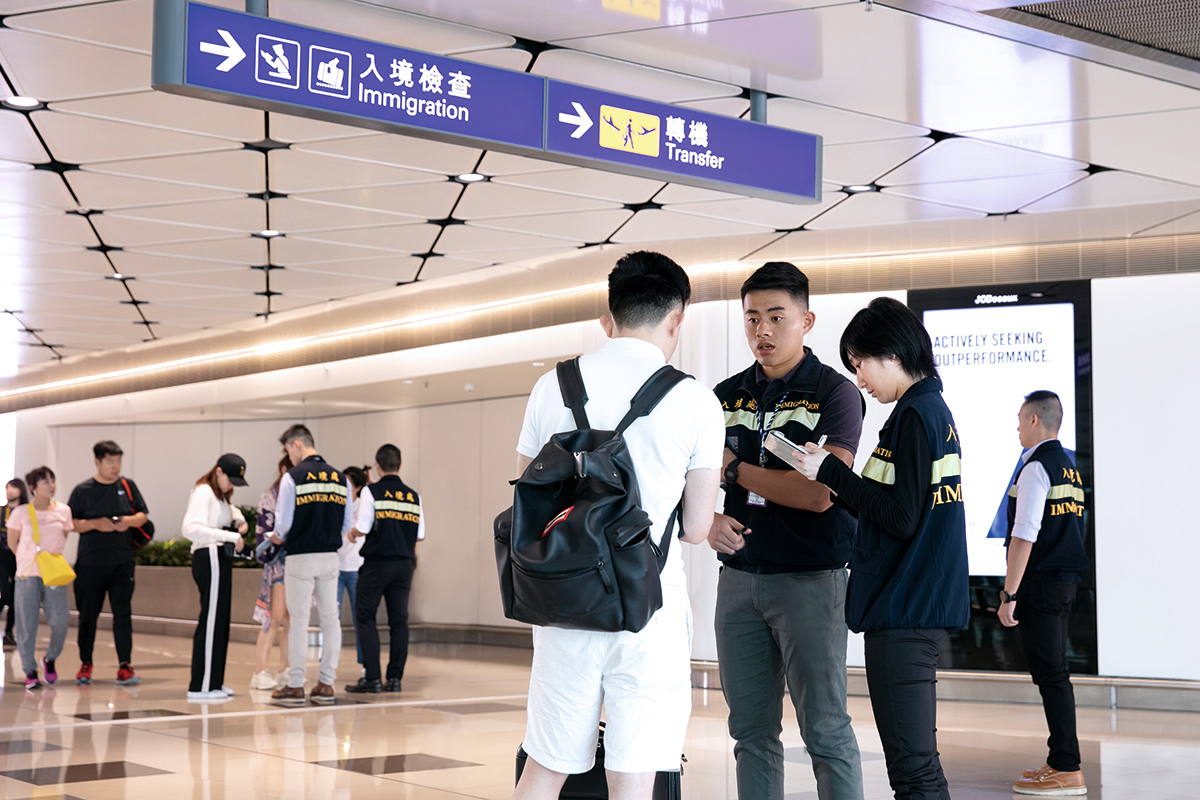
Our officers conduct operations at the Hong Kong International Airport as well as various border and harbour control points.
To enhance the professional knowledge and awareness of CT-related issues among its staff, the department organises internal CT training and drills regularly for effective interception of suspicious visitors suspected to have involved in terrorist activities. As at the end of 2019, a total of 101 internal CT training sessions had been provided for 4,965 officers.
In addition, the ICTU, which comprises members of the department and five other disciplined services, organises inter-departmental CT exercises. In March 2019, the ICTU conducted its first inter-departmental CT exercise, codenamed 'Powersky', at Lei Yue Mun Park. The objectives of the exercise were to enhance co-ordination amongst various departments in CT intelligence and response, and to raise public awareness of CT.
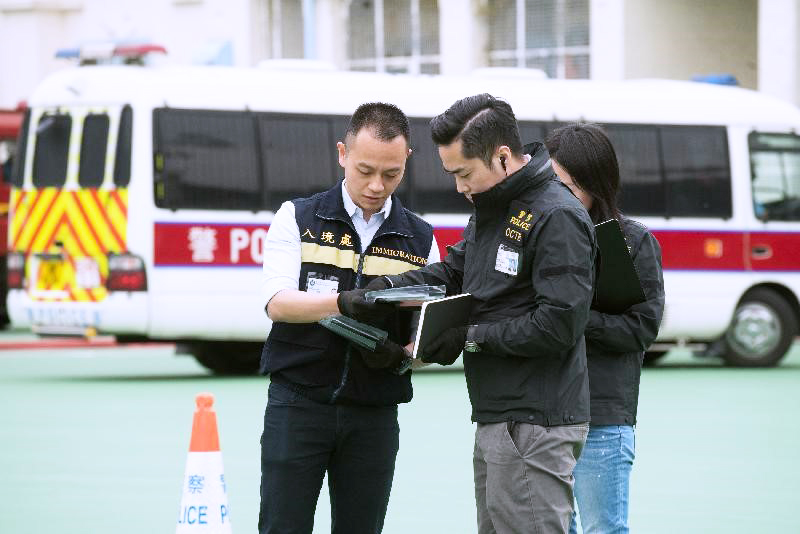
The Inter-departmental Counter Terrorism Unit conducts its first large-scale inter-departmental counter-terrorism exercise, codenamed 'Powersky', at Lei Yue Mun Park.
To keep Hong Kong free from terrorist threats, the department proactively exchanges intelligence with local, Mainland and overseas law enforcement agencies through different channels. Based on the analysed intelligence, the department exercises effective immigration control in accordance with the law to prevent entry of undesirable persons who may pose a threat to the law and order of Hong Kong.
Combating Mainland Pregnant Women Coming to Hong Kong for Confinement by Illegal Means
The department is committed to combating Mainland pregnant women giving birth in Hong Kong through illicit means. In 2019, the department prosecuted four Mainland pregnant women who had overstayed to give birth in Hong Kong and two Mainland pregnant women who gave birth in Hong Kong through illicit means. They were all convicted and sentenced up to 15 months' imprisonment.
To tie in with the implementation of 'zero-quota' policy promulgated by the HKSAR Government in 2013, the department set up a special task unit in November 2012 to collect relevant data from private hospitals for analysis so as to combat cases of obtaining 'Confirmation Certificate on Delivery Booking' for delivery in Hong Kong by means of bogus marriages. As at the end of 2019, a total of 538 doubtful cases were detected from about 36,031 delivery bookings with 52 persons successfully prosecuted, which included 15 Mainland pregnant women, 30 Hong Kong resident husbands and 7 intermediaries.
To crack down on illegal hostels for Mainland pregnant women, the department has worked closely with the HKPF and the Office of the Licensing Authority of the Home Affairs Department in exchanging intelligence and conducting joint operations since February 2012. In 2019, 26 joint operations were conducted to inspect unlicensed guesthouses to deter non-local pregnant women from entering Hong Kong early in order to evade immigration examination.
Combating Illegal Migration and Human Smuggling
The department takes an active role in combating illegal migration and human smuggling and contributes to controlling and preventing the spread of illegal migration as well as preventing Hong Kong from being used as a springboard for human smuggling activities. The Special Investigation Section, formed in early 1980s, is specialised in the investigation of organised immigration offences, including human smuggling activities, occurring in or involving Hong Kong. It works closely with other law enforcement agencies in Hong Kong, the Mainland and overseas with the mutual aim of combating organised human smuggling activities.
As a member of the Inter-departmental Joint Investigation Team, the department will continue to discuss the latest trends of trafficking in persons (TIP) and exchange intelligence with other members, including the HKPF, the Customs and Excise Department and the Labour Department and conduct joint investigations/operations against TIP activities with other law enforcement agencies.
The department, from time to time, conducts interdiction exercises at Hong Kong International Airport to apprehend forged travel document users and forgery syndicate members. The exercises include conducting inspections at the gates of arrival and departure flights, spot checks of travel documents of passengers inside the transit lounge and at boarding gates and the SkyPier, as well as surveillance operations. In December 2019, the department conducted a large-scale operation codenamed 'Sky League' again at Hong Kong International Airport with the participation of various local consulate representatives as advisers or observers. During the operation, the travel documents of 1,514 passengers of 757 departure/arrival flights and arrival ferries from the SkyPier were spot-checked.
At the initial stage of the implementation of the Unified Screening Mechanism, smuggling via the Mainland was one of the main ways of arrival of claimants to Hong Kong. Among them, the majority originated from countries not enjoying visa-free access to Hong Kong, including Vietnam, Pakistan and Bangladesh. The department is very concerned about the situation, and has been maintaining close liaison and intelligence exchange with the HKPF and the Mainland authorities for joint efforts in combating these illicit activities at source. Since the commencement of the special operations in mid-February 2016, the border control departments and the exit and entry offices of relevant Mainland provinces have taken sustained enforcement action against illegal immigration activities in various Mainland provinces. The effectiveness of the operations has been remarkable. The number of non-ethnic Chinese illegal immigrants (NECIIs) intercepted has been declining significantly since mid-2016. In 2019, a total of 859 NECIIs (a monthly average of 72) were intercepted, a drop of 83 per cent compared with the peak of 1,241 NECIIs (a monthly average of 414) intercepted in the third quarter of 2015. During the same period, the department conducted 10 joint operations with Mainland law enforcement agencies and the HKPF and smashed a number of cross-boundary crime syndicates, resulting in the arrest of 506 involved persons, including 164 core members of smuggling syndicates.
Following months of intelligence analysis and in-depth investigations, in a joint operation with the Guangdong Provincial Public Security Department and the Division of Exit-entry Administration of the Shenzhen Municipal Public Security Bureau in March 2019, the department smashed a cross-boundary human smuggling syndicate that specialised in arranging for Vietnamese nationals to seek illegal entry into Hong Kong. During the operation, a total of 22 suspects, including five core syndicate members, were arrested in Guangdong Province and Hong Kong.
In August 2019, a joint operation codenamed 'Ironhill' was conducted by the department, the HKPF, the Guangdong Provincial Public Security Department, the Division of Exit-entry Administration of the Shenzhen Municipal Public Security Bureau and the Guangdong Coast Guard Corps, cracking down on a cross-boundary human smuggling syndicate that specialised in arranging for Vietnamese nationals to seek illegal entry into Hong Kong. During the operation, a total of 66 suspects, including 13 core syndicate members, were arrested in Guangdong Province and Hong Kong.
The department noted that syndicates arranging entry of NECIIs into Hong Kong would change tactics from time to time, in routes to Hong Kong and in modes of operation. Hence, the department will continue to work closely with the local and Mainland law enforcement agencies to take vigorous action against illegal immigration activities on land and at sea, and crack down on syndicates.
The Operational Research Section and the TIG of AIM closely monitor the latest trends in illegal migration and the modus operandi adopted by human smuggling syndicates. They maintain close liaison with the local, Mainland and overseas authorities and representatives of foreign counterparts in the exchange of relevant intelligence and trends. Frontline officers would be instantly alerted whenever new trends in forged travel documents and illegal migration are observed.
In May 2018, AIM received intelligence and intercepted a Sri Lankan male and a Canadian male who were involved in illegal migration activities. On 18 January 2019, they pleaded guilty to one count of conspiracy to obtain services by deception and were sentenced to 18 and 22 months' imprisonment respectively in the District Court. Meanwhile, the Sri Lankan male also pleaded guilty to one count of possession of a forged travel document and was sentenced to 18 months' imprisonment. All sentences were to run concurrently, making a total of 18 months' imprisonment.
Formation of Foreign Domestic Helpers Special Investigation Section (FIS) [New Item]
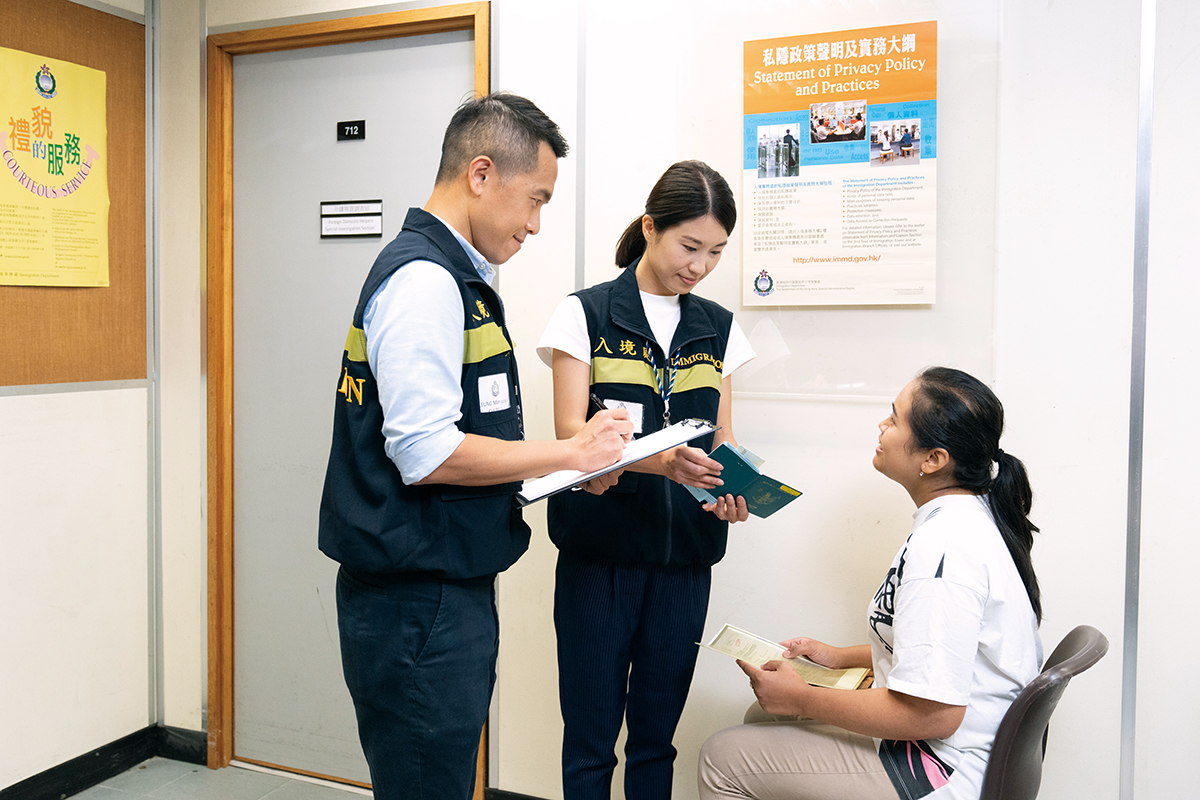
Foreign Domestic Helpers Special Investigation Section was set up in 2019 to conduct initial screening before vetting visa applications from foreign domestic helpers.
In response to the 'Action Plan to Tackle Trafficking in Persons and to Enhance Protection of Foreign Domestic Helpers in Hong Kong' promulgated by the government, FIS was set up on 2 December 2019. The key tasks of FIS are to conduct initial screening before vetting visa applications from FDHs so as to facilitate early identification of potential TIP victims and exploitation relating to FDHs, and to conduct investigations of related immigration offences.
Immigration officers have all along been conducting screening and identification of vulnerable persons who are arrested or who put themselves forward to the authorities under the TIP victim screening mechanism, with a view to ascertaining whether they are TIP victims. With the formation of FIS, the coverage of the TIP victim screening mechanism has been extended to FDH visa applicants. FIS officers will conduct initial screening of suitable FDH visa applicants before vetting their applications.
The department has always been providing suitable and adequate training and support for frontline officers. To heighten staff's TIP awareness, the department has included the topic of TIP in the induction training for all officers. In addition, relevant enforcement officers will attend training sessions on TIP victim identification provided by the European Union Agency for Law Enforcement Cooperation and the International Organization for Migration.
Combating Bogus Marriages
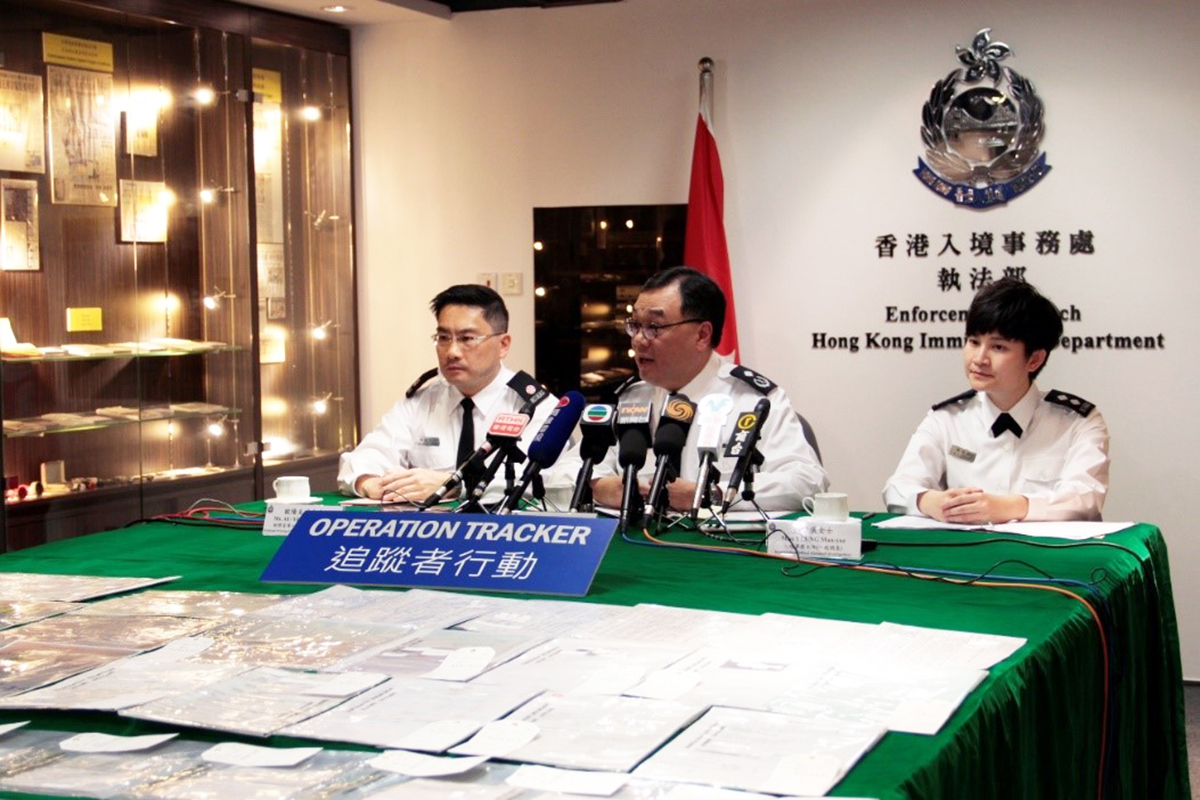
The department smashed cross-boundary syndicates in a series of operations against bogus marriages codenamed 'Flashspear', 'Snare' and 'Tracker'.
The department has grave concerns about non-Hong Kong residents coming for residence in Hong Kong by means of bogus marriages. These people contracted bogus marriages with Hong Kong residents in order to gain entry into Hong Kong and eventually for settlement.
On 18 December 2006, the department set up a special task force to collate intelligence through various sources and to conduct thorough investigations with a view to taking prosecution action against offenders.
To further combat bogus marriage cases, the Marriage Registries of our Department have stepped up checking on suspected cases, while the Investigation Sub-division has also initiated investigations into suspected bogus marriages. With these measures in place, a number of suspected cases were swiftly detected and the persons involved were convicted of relevant offences.
In 2019, a total of 71 persons were convicted of offences relating to bogus marriages and were sentenced to jail terms ranging from 7 to 39 months.
The department has been aware that some criminal syndicates have continually published messages via newspapers, instant messaging software and social networking mobile applications to induce young people to engage in bogus marriages through promising huge remuneration. In recent years, the department smashed four cross-boundary syndicates in a series of operations against bogus marriages codenamed 'Flashspear', 'Snare' and 'Tracker'.
In a series of operations codenamed 'Tracker', our investigators had for the first time discovered the suspected involvement of FDHs in bogus marriages. A total of 37 Hong Kong and Mainland residents and FDHs have been arrested, including the mastermind of the syndicate who was a Hong Kong permanent resident. The mastermind was convicted of four counts of conspiracy to defraud and one count of perverting the course of justice and was sentenced to 39 months' imprisonment in February 2019, while a further 14 arrestees of the case were convicted of the offence of conspiracy to defraud and were sentenced to jail terms ranging from 8 to 18 months.
For persons who have obtained their residence in Hong Kong by fraudulent means, their HKICs and residence status will be invalidated according to the laws of Hong Kong. They will also be subject to removal to their places of origin.
To remind members of the public, including young people, of the serious consequences of participating in bogus marriages, the department has from time to time disseminated information on crackdowns on bogus marriage syndicates and intermediaries as well as the arrest of persons engaging in bogus marriages through various channels including press releases and media interviews. In addition, the department has also produced a short video to remind the public against falling into the trap of bogus marriages, which has been uploaded to the department's YouTube channel. The department will continue to deliver such messages through various effective means so as to remind members of the public not to participate in illegal activities such as bogus marriages.
Exchange of Intelligence
In the fight against illegal migration and terrorism, exchange of information and intelligence on global human smuggling activities and forgery trends is of utmost importance. The department discusses issues on illegal migration, crimes and terrorism through frequent and regular meetings with major local consular missions. In 2019, the department actively participated in international and regional conferences and seminars. For example, representatives from the department attended the 'Security & Counter Terror Expo' held in London, the United Kingdom, the '7th INTERPOL Global Conference on Human Trafficking and Migrant Smuggling' held in Argentina, and the '2019 World Border Security Congress' held in Morocco. The department has successfully established an effective communication network and a good working relationship with foreign and Mainland counterparts, thereby facilitating the exchange of intelligence and proactive action against illegal migration and terrorist activities. Useful intelligence that may help detecting, disrupting or suppressing illegal migration and terrorist activities will be promptly disseminated through the established mechanism.

